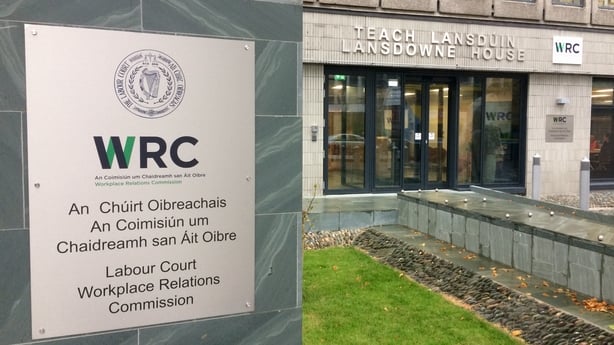The events at RTÉ in recent months have shone a light on the legal issues that come into play when someone in a senior position leaves an organisation.
RTÉ Legal Affairs Correspondent Orla O'Donnell has been examining why companies and their senior employees enter into "termination agreements", what such agreements entail and why they are usually kept secret.
This week saw the largest ever award for unfair dismissal granted by the Workplace Relations Commission.
Tech firm, Hyph Ireland Limited - formerly known as Xhail Ireland Limited - was ordered to pay a total of €464,000, including €440,000 for losses for dismissal, to its former chief executive officer, Mick Kiely, who was ousted from his position in 2021.
Mr Kiely founded the firm in 2013, and had a salary of €340,000 a year.
The €440,000 awarded to him under the Unfair Dismissals Act surpasses the previous record award of €329,000 granted to a fired sales executive in May 2022.
Such awards go some way towards explaining why employers often seek to avoid the WRC and to "buy off" any possible legal action from an ex employee, by entering into a "termination" or "compromise" agreement with them.
Solicitor Peter McInnes, of McInnes, Dunne, Murphy, explains that once an employee has 12 months service they have "fairly significant protection" against being unfairly dismissed. Every dismissal is deemed to be unfair, he points out, unless the employer can show that it's not. It's relatively straightforward to submit a complaint to the WRC and no award of costs can be made against a complainant.
There's an inherent risk for an employer, he says, that the dismissal will be found to be unfair and the proceedings also take time and effort. Lots of employers do not want to take the risk and see the sense in reaching an agreement rather than dismissing someone and waiting for a costly claim to come.
'Any business would see the logic of matters like this being confidential'
Solicitor Wendy Doyle says such agreements are a way for employers and employees to mutually part ways in circumstances where there could be "a lot going on in the background" and where there might be the possibility of legal action.
Normally, when someone's employment comes to an end in a resignation or a dismissal, they are entitled to be paid for their notice period and for any untaken annual leave, she says. Termination agreements allow for them to be paid more - sometimes much more - than that, in full and final settlement of the case.
Ms Doyle points out that the employer has to ensure that the employee has the opportunity to take independent legal advice. Once that's done and the deal is signed by both sides, it's legally binding. The matter is wrapped up quickly for the employer and the ex employee gets a sum of money in return for bringing an end to the issues. The independent legal advice they have received means they can't claim they didn't understand what they were signing.
These compromise agreements often involve a number of other clauses beyond an undertaking not to take legal action against the employer.
Ms Doyle says there can be a "mutual non disparagement" clause as well as obligations to return company property. And she says it's "unheard of" not to have a confidentiality clause in the agreement.
She says she has dealt with numerous termination agreements in the last few weeks alone and the confidentiality clause is "very usual". It's a clause, she says, she ensures is inserted when she is acting for an employer - who are usually the ones pushing for it. But she says it also provides protection for the employee.

Employers want it, she says, because it means the "floodgates are not opened" to other similar claims from other employees.
Having the details out there may also open up a lot of questions - such as how the payment was agreed on.
Compromise agreements are tailored to each individual, she says, and five people sitting beside each other in work may each get a different sum of money. The confidentiality clause usually limits the employee to revealing details to professional advisers - such as lawyers or accountants, revenue commissioners or family members who must also respect the confidentiality agreement.
Peter McInnes agrees that such confidentiality clauses are "routine".
In his experience, he says, he has "rarely seen" a dispute about having this provision in an agreement. He says he has seen them in all kinds of companies - in the private and public sectors.
"Any business would see the logic of matters like this being confidential," he says, and he adds a public or semi-State company would want to buy off the risk of legal action just as much as a company in the private sector.
Mr McInnes says it is up to any party to seek to impose whatever terms they wish on an agreement.
In RTÉ’s case, he says there's no statutory obligation on it to prevent it from seeking confidentiality clauses even though public money is involved. He says he has seen "the odd agreement" where there's no confidentiality requirement, but, he says, this is usually because the details of the issue have already been ventilated rendering such a clause futile. And, he says, in his view "the majority of employees want confidentiality too".
Whether or not such an agreement can be breached, even if an organisation claims it needs to do so in the "public interest", depends on how it's drafted, according to a senior legal source with experience in the area.
But in general if an employer breaches a confidentiality clause, the former employee could sue for damages. This lawyer says confidentiality usually suits all the parties. But there's usually one side that wants it more desperately than the other. He points out that even if a company's lawyers recommend such a clause, the company has the option of disregarding this legal advice.
However, once such a clause is in place, it is binding - even in a situation where privilege applies.
Barrister Shane English points out that the privilege attached to those making statements in the houses of the Oireachtas or in Oireachtas committees, is really only a protection against defamation proceedings.
In relation to the current situation at the national broadcaster, Mr English points out that if RTÉ and a former employee have reached a "properly constructed, binding agreement" then there is the possibility of litigation if the details are revealed without permission, even if this is done "under privilege" at an Oireachtas committee.
Mr English says it may be a defence for a company executive to say they breached the agreement "in the public interest" but if it's a straightforward, binding agreement, then it's debatable whether this would be a successful defence.

Another very experienced senior lawyer says such a course of action would inevitably end up in the High Court.
Confidentiality clauses with severance agreements are not untypical he says, when someone's "number is up" and they have to leave an organisation. He says he cannot think of a case where there has been a debate about whether or not the public interest trumps confidentiality provisions in a contract and he believes it’s "highly unlikely" there will be such a case.
Peter McInnes says he agrees with the legal advice given by legal firm Arthur Cox to RTÉ and published earlier this week.
He says if RTÉ was to ignore what it has signed up to, it would be at risk of a damages claims for breach of contract. And he says he doesn't see what can be done about the agreements that have already been finalised.
However, he suggests the RTÉ "saga" has thrown "new light" on how organisations in the semi-State and public sectors approach such agreements in the future.
Personally, he says he thinks confidentiality is a "good thing" for both parties in a termination agreement.
But he suggests, semi-State and public companies "may say they need to alter their position on these types of agreements". And, he says, they may take a different approach to the "non disclosure" obligation in the future.







